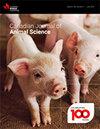Effect of quercetin supplementation on growth performance, nutrient digestibility, excreta bacterial count, noxious gas emission, and meat quality of broilers when fed different protein diets
IF 1
4区 农林科学
Q3 AGRICULTURE, DAIRY & ANIMAL SCIENCE
引用次数: 1
Abstract
Abstract This study aimed to evaluate the effect of flavonoid supplementation to a low-protein diet (LCP) on growth performance, nutrient digestibility, excreta bacterial count, and excreta gas emission of broilers. In total, 800 one-day-old Ross 308 broilers (BW; 42.90±1.43g) were randomly sorted into one of the 4 dietary treatments (10 pens/treatment; 20 birds/pen). Treatment diets were high-protein diet (HCP), basal diet; LCP, basal diet−2.5% protein; TRT1, LCP+0.025% quercetin; and TRT2, LCP+0.050% quercetin. Experimental diets were provided to broilers from days8 to 35. HCP, TRT1, and TRT2 showed higher body weight gain (BWG) than the LCP group during days8–21 and in the overall experiment. However, feed conversion ratio of the HCP group was improved than that of the LCP group during days8–21 and in the overall period. The increasing level of quercetin supplementations brought a linear increase in BWG. Lactobacillus, Escherichia coli, and Salmonella counts in excreta samples of the experimental groups showed no significant difference. Flavonoid supplementation (0.050%) reduced drip loss in breast muscle more than that in the LCP group and showed a linear reduction. Through improved digestion, quercetin addition to an LCP reversed the BWG.添加槲皮素对不同蛋白质日粮肉鸡生长性能、养分消化率、排泄菌数、有害气体排放和肉质的影响
摘要本研究旨在评估在低蛋白日粮中添加黄酮类化合物对肉鸡生长性能、营养物质消化率、排泄菌计数和排泄气体排放的影响。总共将800只一日龄Ross 308肉鸡(BW;42.90±1.43g)随机分为4个日粮处理之一(10个围栏/处理;20只鸟/围栏)。治疗日粮为高蛋白日粮(HCP)、基础日粮;LCP,基础饮食−2.5%蛋白质;TRT1、LCP+0.025%槲皮素;TRT2、LCP+0.050%槲皮素。试验日粮从第8天至第35天提供给肉鸡。HCP、TRT1和TRT2在第8-21天和整个实验中显示出比LCP组更高的体重增加(BWG)。然而,在第8-21天和整个期间,HCP组的饲料转化率比LCP组有所提高。槲皮素补充水平的增加使BWG呈线性增加。实验组排泄物样本中的乳酸杆菌、大肠杆菌和沙门氏菌计数无显著差异。与无导线心脏起搏器组相比,补充类黄酮(0.050%)可减少胸肌的滴水量,并呈线性减少。通过改善消化,将槲皮素添加到LCP中可以逆转BWG。
本文章由计算机程序翻译,如有差异,请以英文原文为准。
求助全文
约1分钟内获得全文
求助全文
来源期刊

Canadian Journal of Animal Science
农林科学-奶制品与动物科学
CiteScore
2.30
自引率
0.00%
发文量
51
审稿时长
6 months
期刊介绍:
Published since 1957, this quarterly journal contains new research on all aspects of animal agriculture and animal products, including breeding and genetics; cellular and molecular biology; growth and development; meat science; modelling animal systems; physiology and endocrinology; ruminant nutrition; non-ruminant nutrition; and welfare, behaviour, and management. It also publishes reviews, letters to the editor, abstracts of technical papers presented at the annual meeting of the Canadian Society of Animal Science, and occasionally conference proceedings.
 求助内容:
求助内容: 应助结果提醒方式:
应助结果提醒方式:


